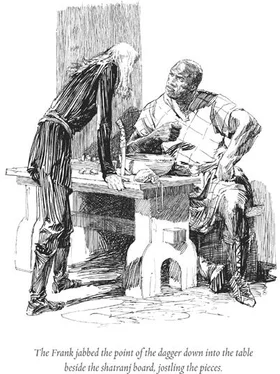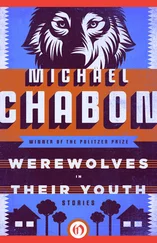Michael Chabon - Gentlemen of the Road
Здесь есть возможность читать онлайн «Michael Chabon - Gentlemen of the Road» весь текст электронной книги совершенно бесплатно (целиком полную версию без сокращений). В некоторых случаях можно слушать аудио, скачать через торрент в формате fb2 и присутствует краткое содержание. Жанр: Исторические приключения, на английском языке. Описание произведения, (предисловие) а так же отзывы посетителей доступны на портале библиотеки ЛибКат.
- Название:Gentlemen of the Road
- Автор:
- Жанр:
- Год:неизвестен
- ISBN:нет данных
- Рейтинг книги:3 / 5. Голосов: 1
-
Избранное:Добавить в избранное
- Отзывы:
-
Ваша оценка:
- 60
- 1
- 2
- 3
- 4
- 5
Gentlemen of the Road: краткое содержание, описание и аннотация
Предлагаем к чтению аннотацию, описание, краткое содержание или предисловие (зависит от того, что написал сам автор книги «Gentlemen of the Road»). Если вы не нашли необходимую информацию о книге — напишите в комментариях, мы постараемся отыскать её.
Gentlemen of the Road — читать онлайн бесплатно полную книгу (весь текст) целиком
Ниже представлен текст книги, разбитый по страницам. Система сохранения места последней прочитанной страницы, позволяет с удобством читать онлайн бесплатно книгу «Gentlemen of the Road», без необходимости каждый раз заново искать на чём Вы остановились. Поставьте закладку, и сможете в любой момент перейти на страницу, на которой закончили чтение.
Интервал:
Закладка:
“There is no reason, at this point, not to consider him our property by right,” Zelikman argued. “A gentleman of the road worthy of the title would convey him to the nearest slave market and see what price he fetched.”
“I fear that explains our overall lack of success at this game, Zelikman,” Amram said. “Because I'm not going to do that.”
“No,” Zelikman said sadly “Neither am I.”
But when they returned to the willow tree, they found no stripling, only the raveled strands of a camel-hide lanyard swaying like willow branches in the breeze. This discovery dismayed Amram, but he was inclined, according to the tenets of his personal philosophy, to accept it and go along their way. He might have persuaded Zelikman of the wisdom of this course, but when they went to find the horses they had tied up in the copse, they found their saddlebags and Porphyro-gene but no trace of the gold from the inn or of the curly coated, big-nosed half-Arabian, Hillel.
Hastily they tied the goats, slung them from Por-phyrogene's saddle and set off, riding tandem, up the track. Burdened by two riders, even a strong Parthian stallion could not hope to match the speed of the lithe and sure-footed Hillel, and by the time they reached the pass and the main road that descended in lazy switchbacks to the shore of the Caspian and then north to the city of Atil, Filaq's relative inexperience and unbalanced mental state held their only hope of retrieving him and, more important, Zelikman's horse, a loss that was already threatening to plunge Zelikman, the effects of his hemp pipe having long since dwindled, into a gloom that promised to be dark indeed.
“This accursed country into which you led us has already cost me my hat,” Zelikman said. “Not to mention a sack of gold. But if it costs me Hillel too, I'll take it very ill indeed.”
Amram refrained from pointing out, though not without effort, that this Caucasian jaunt had originated in a pipe dream of Zelikman's. He had already seen the broken turf up ahead and the shaft of a black-fletched arrow protruding from a blasted trunk at the edge of a clearing about forty feet farther along. He swung down from the horse and crouched, creeping along on his heels, reading the alphabet of horseshoe prints and other stray marks of struggle.
“Buljan's hunters have found him,” he said presently, having concluded his study of the text in the dirt. “They caught him there. He struggled. He knocked one of them down. And then they tied him, here, and put him on a horse. And set off again. Headed north.”
“Why didn't they kill him?” Zelikman said. “At long last?”
“Perhaps they did. But I see no sign of it.”
“And Hillel? Yes. I see his marks.”
He sat down under the blasted tree, and Amram could see him sinking, as a man watches the sun sink into the western sea, into the darkness of his thoughts. As little chance as they had stood of catching Hillel, their situation was now more hopeless still, for even if they somehow managed to catch the party of man-hunters, they would find themselves faced with odds of at least a dozen to one.
“Get up,” Amram said.
Zelikman looked up at him, his face blank, soot-streaked, filling with that unshakable weariness as rapidly as a staved-in hull fills with cold black sea.
“Where is the point?” Zelikman said.
“Here,” Amram said, drawing his dagger and holding it, as he had lately held it in the caravansary, less than the breadth of a finger from Zelikman's throat. “I would rather have your death on my conscience or, failing that, face a week's hard riding and a gang of armed bravos than suffer through a month or more of listening to your maunderings.”
Zelikman considered the dagger and his partner's face and appeared seriously to weigh the three possibilities that Amram had just named. Then he held out his hand, and Amram dragged him to his feet.
“Just when did you acquire a conscience?” Zelikman said.
“A figure of speech. Which will it be?”
Zelikman yanked the arrow out of the charred trunk and handed it with a shrug to Amram.
“Only because I know how Hillel pines for me,” he said.
CHAPTER FOUR
All that remained of the temple, reared by Alexander during his failed conquest of Caucasia and affiant now to that failure and to the ruin of his gods, was a wind-worn pedestal and the candle stub of a fluted column, against which a would-be ruffian named Hanukkah sat propped with his right hand over the wound in his sizable belly, as he had sat for two long days and nights, waiting with mounting impatience for the angel of death.
He had failed as a farmer, a dealer in hides, a soldier, and now as a hunter of men, a trade he undertook on a misguided whim, riding as last-minute replacement for a more qualified killer whose career of violence ended in a tavern on the night before the hunting party set out from Atil to track down the last free survivor of Buljan's coup.
The other five manhunters who like Hanukkah had remained true to the cause-or at any rate to the gold- of their employer lay scattered around the ruin like the tumbled fragments of a colonnade. Among them were two of their erstwhile comrades, who had been turned by the haughty manner and readier gold of their prisoner and the promise of more gold to come. Distilled by the sun of two days, their stench was wafted tenderly in the direction of Hanukkah's nose by the beating wings of buzzards, which had arrived within hours of the slaughter, in their black finery, to feast.
Beside him, nestled in the crook of his left arm, lay a skin in which remained a few swallows of clean water, which Hanukkah had been denying himself in the hour since dawn in the hope of hastening his demise. His belly wound had ceased to cause him much pain, which he took as a favorable sign that the angel had concluded whatever other business had been delaying him and was hastening even now to collect him. The recriminations that assailed Hanukkah through the first hours of his vigil were faded to a philosophical regret at the waste that attended all human ambition. It was only his vain desire to gain the money he needed to purchase the freedom of his beloved Sarah, a whore in a Sturgeon Street brothel, that had led him to offer his sword in the murderous service of Buljan. Hanukkah had no quarrel with the old bek, and in fact had been inclined to view him as an able leader, worthy of loyalty and tribute. He had been an unwilling participant in the raid on the stronghold in Azerbaijan, and in fact had spent the hour it endured cowering under a hay wagon at the back of a stable.
Though only a week earlier the idea would have struck him as heresy, as he lay waiting to become carrion he considered that plump and vivacious Sarah was perhaps unworthy of his suffering and death, when after all, she chewed with her mouth open and her wind, when she had been consuming too much milk, gave off an unsettling odor of brimstone.
But when he remarked the travelers, a giant African and a black-hatted scarecrow crowded onto the broad back of a massive spotted horse that looked to be on the verge of collapse, Hanukkah forgot his resolve and took a long warm swig from his water skin. The sight of living beings who were not, presumably, eaters of dead flesh awoke a fresh desire in Hanukkah, despite the wound to his belly, to prolong his existence just a little while longer, and perhaps to see his plump Sarah once more.
“Friends,” he called in Arabic, his voice a raucous barking.
The African reined in the tottering horse with its flecked lips and wild eye, and the travelers dismounted, the African with a weary grace and no expression, the scarecrow with grimaces and a show of soreness in the underparts. The big man unsaddled the horse, peeled away the blanket and led the spotted stallion from the slaughtered men and scavenger birds to a blotch of patchy grass in the unpersuasive shade of a gnarled juniper. There was a thin trickle of fresh water a few rods beyond the tree, and the horse lay down its ears and snorted, once, scenting it. The African patted the horse's neck and spoke to it in a velvet language, and Hanukkah caught sight of the broad ax slung across the giant's back and began to regret his decision to call attention to himself, because kindness to horses was often accompanied in soldiers by an inclination, when it came to men, to brutality
Читать дальшеИнтервал:
Закладка:
Похожие книги на «Gentlemen of the Road»
Представляем Вашему вниманию похожие книги на «Gentlemen of the Road» списком для выбора. Мы отобрали схожую по названию и смыслу литературу в надежде предоставить читателям больше вариантов отыскать новые, интересные, ещё непрочитанные произведения.
Обсуждение, отзывы о книге «Gentlemen of the Road» и просто собственные мнения читателей. Оставьте ваши комментарии, напишите, что Вы думаете о произведении, его смысле или главных героях. Укажите что конкретно понравилось, а что нет, и почему Вы так считаете.












